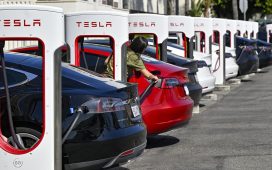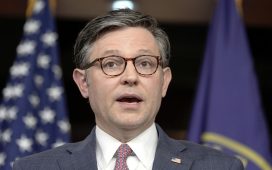With help from Brianna Gurciullo
Editor’s Note: This edition of Morning Transportation is published weekdays at 10 a.m. POLITICO Pro Transportation subscribers hold exclusive early access to the newsletter each morning at 6 a.m. To learn more about POLITICO Pro’s comprehensive policy intelligence coverage, policy tools and services, click here.
Story Continued Below
— President Donald Trump laid down his priorities ahead of today’s meeting with House Democrats to talk infrastructure funding.
— Airports and lawmakers are worried about DHS’ plans to both reassign TSA staff to the southern border and potentially redirect some of the transportation security agency’s funds.
— Federal safety investigators placed blame for a fatal 2017 Amtrak derailment with the track owner, the train operator, and state and federal regulators.
IT’S WEDNESDAY: Thanks for tuning in to POLITICO’s Morning Transportation, your daily tipsheet on all things trains, planes, automobiles and ports. Get in touch with feedback, tips or song lyric suggestions at smintz@politico.com or @samjmintz.
LISTEN HERE: Follow MT’s playlist on Spotify. What better way to start your day than with songs (picked by us and readers) about roads, rails, rivers and runways?
HAPPENING TODAY: A second meeting between Democrats and the White House on infrastructure, at which the two parties are planning to discuss how to fund a proposed $2 trillion package.
Trump threw several surprises at Democrats with a letter Tuesday night ahead of the meeting. For one, he said an infrastructure bill will have to take a backseat to the USMCA trade deal, which he wants Congress to pass first. He also said his preferred vehicle for an infrastructure bill is the highway and surface reauthorization, which would limit the legislation to traditional transportation uses, rather than the broad package that House Democrats have envisioned.
Trump also took the chance to jab Democrats, accusing them of canceling a staff-level meeting and claiming that the caucus’ vision on infrastructure has been muddled. “It would be helpful if you came to [today’s] meeting with your infrastructure priorities and specifics regarding how much funding you would dedicate to each. Your caucus has expressed a wide range of priorities, and it is unclear which ones have your support,” he wrote.
Get the details from our Tanya Snyder and POLITICO’s Nancy Cook beofre this morning’s meeting.
THE CLIMATE PUSH: Forty-one Democratic senators wrote to the leadership of the Senate Environment and Public Works committee this week, asking them to prioritize climate and resiliency investments in the upcoming surface transportation authorization.
Related: One of the letter’s signatories, Rep. Ed Markey (D-Mass.), released a white paper outlining principles for “green infrastructure.”
AIRPORTS WORRIED ABOUT TSA REASSIGNMENTS: Airports are concerned about long lines at security checkpoints this summer if TSA bag screeners are reassigned to the southern border, our Stephanie Beasley reported Tuesday. Lance Lyttle, managing director of Seattle-Tacoma International Airport, said at a House hearing that the agency has struggled for years to hire enough staff for Sea-Tac’s 31 screening lanes, and diverting some employees would only compound the issue.
NBC News reported that in addition to reassigning some TSA employees, DHS is also requesting $232 million from the transportation security agency’s fiscal 2019 budget if Congress doesn’t fulfill its request for additional funding for border security. That includes a staggering $3 million in loose change collected from airports.
One idea to address those problems, from Rep. Debbie Lesko (R-Ariz.): More airports should look to privatize their security. “Airports who are concerned by workforce impacts stemming from Washington may consider participation in [the Screening Partnership Program] as a potential solution,” Lesko said, per Stephanie’s story.
Democrats on the Homeland Security Committee took a different approach, saying DHS should have communicated its funding needs to Congress as part of the normal authorization process instead of pulling employees from TSA. “Every time CBP or anybody has ever come through this committee and asked for help, we’ve been gracious,” Chairman Bennie Thompson (D-Miss.) said.
NORTH OF THE BORDER: Canada’s effort to increase the number of sites where travelers can breeze through U.S. customs is off to a rough start, Pro Canada’s Lauren Gardner reports. One example: Billy Bishop Airport in Toronto has long wanted to be part of the country’s Preclearance system, but it doesn’t have enough money build or operate the facilities needed. And the Canadian government hasn’t indicated it will offer any help.
NTSB SAYS CRASH WAS PREVENTABLE: A fatal 2017 Amtrak derailment in Washington could have been prevented by positive train control, NTSB Chairman Robert Sumwalt said Tuesday at an agency meeting on the accident. As our Tanya Snyder reports, the train entered a sharp curve near Dupont, Wash., at 78 mph, despite a 30 mph speed limit, an error that Sumwalt said would have been prevented with PTC. “The sooner PTC is operational nationwide, the sooner that railroads will operate at greatly reduced risk of overspeed derailment,” he said.
NTSB’s probable cause finding blames Sound Transit, Washington State DOT and the FRA for the crash. Sumwalt also said the engineer was “set up to fail” because there was no warning sign ahead of the curve specifically for passenger trains, only for freight. NTSB recommended that Amtrak and its host railroads add those warning signs, and that they institute new training for crew, including simulators, for all features of the locomotive.
CALIFORNIA SUES FRA: California sued the Federal Railroad Administration on Tuesday over the federal agency’s decision to terminate nearly $1 billion in funding for the state’s high-speed rail project. As POLITICO California’s Debra Kahn writes, the suit “challenges FRA’s decision on the grounds that it was arbitrary and capricious.” California is asking the court to dismiss FRA’s action and prevent it from transferring the funds to any other recipient.
What’s next: This is just the first volley in what’s expected to be a lengthy court battle, which could also reverberate on the campaign trail and in infrastructure talks on Capitol Hill.
DEFAZIO, BOEING AGREE ON 737 MAX DOCS: The House Transportation Committee has reached a deal with Boeing on how to handle proprietary information about the 737 MAX, an issue that held up the release of documents to lawmakers, our Brianna Gurciullo reports. Chairman Peter DeFazio (D-Ore.) had criticized Boeing at a hearing last week for the holdup. He told reporters on Tuesday that while a second House hearing on the MAX is planned for next month, Boeing probably won’t testify because the committee needs time to review the company’s documents.
DOC OF THE DAY: See the list of 33 countries that will be represented at an aviation regulators meeting on the MAX’s return to service this Thursday in Texas. Brianna will be reporting from Fort Worth for the all-day gathering.
SUMMER WITHOUT THE MAX: U.S. air carriers are anticipating that 257.4 million people, a new record, will fly with them this summer. John Heimlich, Airlines for America’s chief economist, said on a call with reporters Tuesday that while the grounding of the MAX 8 and 9 has affected the airlines that operate or have ordered them, there is enough “cushion in the system” to handle all the passengers this summer, and the airline industry is “seeing healthy full-year capacity growth.”
Coping mechanisms: “This summer would have another 200 flights per day if the MAX were still in place,” Heimlich said. “But it’s not, so they’ve adjusted the schedule accordingly, and of course they’re not missing all of those flights because airlines have moved in spares or increased frequency of other aircraft types.” To deal with the grounding, airlines have also paused projects like high-speed WiFi installations.
Gerald Buckwater, a former Northrop Grumman executive and an infrastructure adviser to multiple presidents, will become chief operating and strategy officer of the American Society of Civil Engineers, the group announced this week.
— “Facial recognition is making its way to cruise ships.” Quartz.
— “Bill to ban red light cameras in Texas is one step from becoming law.” Dallas Morning News.
— “Self-driving trucks begin mail delivery test for U.S. Postal Service.” Reuters.
— “Boeing official played down scenario that may have doomed Ethiopian jet.” Wall Street Journal.
— “American just made it cheaper to travel with bikes, surfboards, skis and tubas.” USA Today.
DOT appropriations run out in 131 days. The FAA reauthorization expires in 1,592 days. Highway and transit policy is up for renewal in 498 days.









